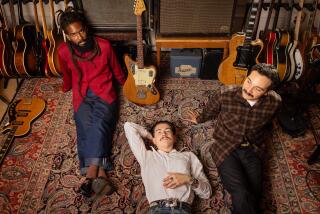It’s Not Constant Sorrow Now
- Share via
ROANOKE, Va. — It’s dinner time and Dan Tyminski of Union Station has that vacant look college athletes sometimes get when surrounded too long by reporters. Since recording the Grammy-winning “I Am a Man of Constant Sorrow,” bluegrass’ newest star hasn’t had much of a break.
At least there’s Foosball in this interview.
“Come on ... let’s see what you got,” he says, brightening when asked about the Foosball table near the entrance of the restaurant. Tyminski, a bear of a man in a white golf cap and T-shirt, grabs the handles and starts slapping at the cork ball with a loud, methodical whack.
Tyminski, it turns out, is a Foosball fanatic. Before joining Alison Krauss, he used to spend as many as 60 hours a week hovering over the little painted men, dreaming of someday becoming a champion Foosballer.
“I was probably more serious about Foosball than I have ever been about music,” Tyminski says.
Those days are over. After years of self-doubt when Tyminski almost quit the music business, the prolific picker from Vermont says he can finally relax. The only career moves he worries about now are what kind of music to play next.
“If I were going to go on a full-fledged solo career, I’d say this is the best opportunity I’ve had and will ever have,” he says, pausing for a moment. “But that’s not where my heart lies. I really love what I do with Alison and Union Station.”
Tyminski, 34, has come a long way since growing up in Rutland, Vt. The small manufacturing community in the Green Mountains is better known for its nearby ski resorts and marble quarries than for bluegrass.
He learned about the twangy mountain music from his parents, Stanley and Patricia Tyminski, who were nuts about it. Dan and his older brother, Stan, spent much of their childhood driving around the country to see such big-time bluegrass acts as Paul Silvias, Smokey Green and Bob French.
It wasn’t long before they picked up guitars themselves.
“I’ve been playing as long as I can remember,” Tyminski recalls. As a child, he learned to carry a tune on his brother’s mandolin. By his mid-teens, he was picking banjo for Stan’s Green Mountain Bluegrass band.
“He was awesome ... wasn’t trying to play like his hero or anything,” says Tim Austin, a longtime friend and founding member of the Lonesome River Band.
But for two boys reared north of the Mason-Dixon line, the pressure to satisfy the hard-core traditionalists of bluegrass was immense.
“We wanted so badly to sound like an authentic Southern bluegrass band,” Tyminski says. “We played a certain way and made sure our song selection was accepted by a certain group of people.”
Somewhere along the way, he figured it out. When he sings, Tyminski’s voice has that hardscrabble sound that’s much more eastern Kentucky than Yankee Vermont.
“People who are not from the mountains, you know, they might speak their words not as good,” says bluegrass legend Ralph Stanley, who recorded a popular version of “I Am a Man of Constant Sorrow” in 1959. “But he’s got a good lick on the guitar. And the sound he’s got, that’s fine.”
After auditioning two other banjo players, Austin persuaded Tyminski in 1988 to move to Roanoke and join Lonesome River.
To make ends meet, Tyminski delivered room service at the Hotel Roanoke and turned a wrench at auto repair shops. But after a few years, it didn’t seem as though the band was going anywhere.
“There was a point when I woke up with my wife and we were three months behind in our rent, and there was a stack of bills,” Tyminski says. “I thought, you know, this is not right for me. I moved back to Vermont.”
But with new members Sammy Shelor and Ronnie Bowman, Lonesome River’s 1991 release, “Carrying the Tradition,” soared to the top of bluegrass charts, winning the International Bluegrass Music Assn.’s album of the year.
The group was hopping, and Tyminski came back to Roanoke. He still wasn’t happy, though. Lonesome River’s harmonies forced him to sing at an uncomfortable pitch. In 1994, he called the band members together and told them about his final move: He was headed to Union Station and Krauss.
“It was tough on our friendship,” Austin says. “But [Alison] was a national act who was in a position to pay money and have insurance. I think he made a wise move.”
Along with Tyminski’s Grammy this year, Union Station won two, including best bluegrass album for “New Favorite.”
After one game of Foosball, Tyminski sits back down. His shot was a bit off.
“The table’s too light,” he says.
With their Grammys in tow, Krauss and Union Station will visit 41 cities starting June 25, along with such bluegrass stars as Ralph Stanley, for the “Down From the Mountain” tour. Krauss also plans to record the band’s first live album this summer, and Tyminski has started work on a second solo album (his first was in 2000).
With the remaining time, he stays home these days with his wife, Elise, and three children in Ferrum, Va.
“This year is for me,” he says. “If there is a day free from our tour schedule, I’m crossing it out as free time.”
*
The “Down From the Mountain” tour will play the Greek Theatre on Aug. 1.
More to Read
The biggest entertainment stories
Get our big stories about Hollywood, film, television, music, arts, culture and more right in your inbox as soon as they publish.
You may occasionally receive promotional content from the Los Angeles Times.










